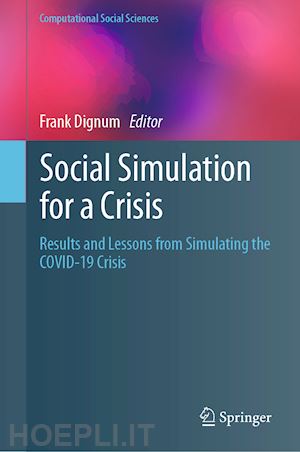

Questo prodotto usufruisce delle SPEDIZIONI GRATIS
selezionando l'opzione Corriere Veloce in fase di ordine.
Pagabile anche con Carta della cultura giovani e del merito, Carta della Cultura e Carta del Docente
Part 1. ASOCC Theory and Platform.- Chapter 1. Introduction.- Chapter 2. Foundations.- Chapter 3. From Theories to Implementation.- Chapter 4. Simulation Use.- Part II. Scenario's and Submodels.- Chapter 5. Closing of Schools.- Chapter 6. Testing & Smart Testing.- Chapter 7. Deployment and Effects of an App for Tracking and Tracing Contacts.- Chapter 8. How Culture Influences the Management of a Pandemic: Simulating the Effect of Culture on the Effective Management of the COVID-19 crisis,- Chapter 9. Economics.- Chapter 10. Exit Strategies.- Part III. Results and Lessons Learned.- Chapter 11. Extensible Model-Building in Crises.- Chapter 12. Comparative Validation of Simulation Models for the COVID-19 Pandemic.- Chapter 13. Supporting Policy Makers in a Crisis.- Chapter 14. From Crisis to Resilience Support.- Chapter 15. Challenges and Issues.- Chapter 16. Conclusions.











Il sito utilizza cookie ed altri strumenti di tracciamento che raccolgono informazioni dal dispositivo dell’utente. Oltre ai cookie tecnici ed analitici aggregati, strettamente necessari per il funzionamento di questo sito web, previo consenso dell’utente possono essere installati cookie di profilazione e marketing e cookie dei social media. Cliccando su “Accetto tutti i cookie” saranno attivate tutte le categorie di cookie. Per accettare solo deterninate categorie di cookie, cliccare invece su “Impostazioni cookie”. Chiudendo il banner o continuando a navigare saranno installati solo cookie tecnici. Per maggiori dettagli, consultare la Cookie Policy.